#Managing chronic conditions
Text
Health Update (6/20/24)
With all the health issues I have going on, it’s hard to determine what issue is causing WHAT problem. Rather than my NMO causing my neck pain, I’m really starting to think it’s my vestibular migraines. I do exercises to help ease my symptoms, but after an impromptu trip out of state I got out of the habit and haven’t done them for several weeks now. I don’t know why I thought of that in the middle of the night but I’m really hoping that’s it. Hopefully getting started on my exercises again with clear up all this neck pain and dizziness because it is SO exhausting and frustrating!
#health update#chronic pain#neck pain#exhausting#Health Issues#Chronic Illness#Vestibular Migraines#NMO (Neuromyelitis Optica)#Chronic Pain Management#Dizziness Relief#Exercise for Health#Pain Relief Tips#Health and Wellness#Managing Chronic Conditions#Migraine Relief#Personal Health Journey#Overcoming Health Challenges#Health and Fitness#Pain and Dizziness Solutions#Self-Care Routine#Chronic Pain Exercises#Wellness Tips#Health Blog
1 note
·
View note
Text
Managing Chronic Conditions and Navigating the Healthcare System
Introduction
Chronic conditions, defined as diseases that are persistent and typically long-lasting in their effects, pose significant challenges not just to the individuals they affect but also to the healthcare systems tasked with managing them. Effective management of these conditions is crucial, as it can greatly influence the quality of life of those affected and alleviate the burdens on healthcare resources. This article aims to provide a comprehensive understanding of managing chronic conditions and navigating the complexities of the healthcare system. Through a semi-conversant yet informative lens, we'll explore strategies for individuals to effectively manage their conditions, advocate for their health needs, and optimize their interactions with healthcare providers.
Understanding Chronic Conditions
Chronic conditions range widely in form and severity, from diabetes and heart disease to arthritis and mental health issues. The common thread among these conditions is their long-term nature and the required continuous management. Early diagnosis and ongoing management are vital in controlling these conditions and maintaining a high quality of life. This section will delve into chronic conditions' biological and social impact, highlighting the importance of a proactive and informed approach to health management.
The Role of the Healthcare System
The healthcare system plays a pivotal role in managing chronic conditions. Its complex network includes primary care physicians, specialists, hospitals, and other healthcare providers. A multidisciplinary approach is often necessary to manage a chronic condition effectively, requiring coordination among various healthcare professionals. Additionally, navigating the intricacies of insurance coverage and healthcare policies is a significant aspect of managing chronic conditions. This section will provide insights into optimizing interactions with healthcare providers and systems for better management outcomes.
Managing Chronic Conditions
Living with a chronic condition often necessitates lifestyle changes and adjustments. From dietary modifications to physical activity and medication adherence, individuals have a significant role in managing their health. This section will explore practical strategies for lifestyle adjustments, the importance of medication management, and the benefits of regular monitoring and self-care practices. Empowering individuals with the knowledge and tools to take charge of their health is crucial in managing chronic conditions.
Navigating the Healthcare System
Effective communication with healthcare providers, managing healthcare records, and understanding patient rights are essential to navigating the healthcare system. This section will offer practical advice for building a productive relationship with healthcare providers, keeping track of health information, and leveraging available patient resources. Navigating the healthcare system with confidence and knowledge can significantly impact managing chronic conditions and the overall healthcare experience.
Conclusion
Managing chronic conditions and navigating the healthcare system are complex but essential tasks for many individuals. Understanding chronic conditions, effectively engaging with the healthcare system, and adopting proactive management strategies can significantly improve health outcomes and quality of life. Advocating for oneself and staying informed are key. As the healthcare landscape continues to evolve, so will the strategies for managing chronic conditions. Armed with the right knowledge and resources, individuals can face these challenges head-on, leading to a more empowered and health-focused future.
Stepping Up For Seniors
Financial Assistance for Seniors
Senior Financial Support
https://stretchesforbackpainshreveport254.blogspot.com/
https://santamonicapersianrugrestorat718.blogspot.com/2024/05/stretches-for-back-pain-shreveport.html
https://www.tumblr.com/taylogbusinessspaces/750006765243023360
https://basementfinishingcompanyoverl760.blogspot.com/
https://basementrefinishingnearmeprai398.blogspot.com/2024/05/basement-finishing-company-overland.html
https://managingchronicconditionsandn752.blogspot.com/
#homecare#rent assistance#elderly care#financial aid#senior health#medical bills#assistance for senior#assisted living#senior assistance#senior care#financial assistance for seniors#stepping up for seniors#managing chronic conditions#chronic conditions
0 notes
Text
Managing Chronic Conditions and Navigating the Healthcare System
Introduction
Chronic conditions, defined as diseases that are persistent and typically long-lasting in their effects, pose significant challenges not just to the individuals they affect but also to the healthcare systems tasked with managing them. Effective management of these conditions is crucial, as it can greatly influence the quality of life of those affected and alleviate the burdens on healthcare resources. This article aims to provide a comprehensive understanding of managing chronic conditions and navigating the complexities of the healthcare system. Through a semi-conversant yet informative lens, we'll explore strategies for individuals to effectively manage their conditions, advocate for their health needs, and optimize their interactions with healthcare providers.
Understanding Chronic Conditions
Chronic conditions range widely in form and severity, from diabetes and heart disease to arthritis and mental health issues. The common thread among these conditions is their long-term nature and the required continuous management. Early diagnosis and ongoing management are vital in controlling these conditions and maintaining a high quality of life. This section will delve into chronic conditions' biological and social impact, highlighting the importance of a proactive and informed approach to health management.
The Role of the Healthcare System
The healthcare system plays a pivotal role in managing chronic conditions. Its complex network includes primary care physicians, specialists, hospitals, and other healthcare providers. A multidisciplinary approach is often necessary to manage a chronic condition effectively, requiring coordination among various healthcare professionals. Additionally, navigating the intricacies of insurance coverage and healthcare policies is a significant aspect of managing chronic conditions. This section will provide insights into optimizing interactions with healthcare providers and systems for better management outcomes.
Managing Chronic Conditions
Living with a chronic condition often necessitates lifestyle changes and adjustments. From dietary modifications to physical activity and medication adherence, individuals have a significant role in managing their health. This section will explore practical strategies for lifestyle adjustments, the importance of medication management, and the benefits of regular monitoring and self-care practices. Empowering individuals with the knowledge and tools to take charge of their health is crucial in managing chronic conditions.
Navigating the Healthcare System
Effective communication with healthcare providers, managing healthcare records, and understanding patient rights are essential to navigating the healthcare system. This section will offer practical advice for building a productive relationship with healthcare providers, keeping track of health information, and leveraging available patient resources. Navigating the healthcare system with confidence and knowledge can significantly impact managing chronic conditions and the overall healthcare experience.
Conclusion
Managing chronic conditions and navigating the healthcare system are complex but essential tasks for many individuals. Understanding chronic conditions, effectively engaging with the healthcare system, and adopting proactive management strategies can significantly improve health outcomes and quality of life. Advocating for oneself and staying informed are key. As the healthcare landscape continues to evolve, so will the strategies for managing chronic conditions. Armed with the right knowledge and resources, individuals can face these challenges head-on, leading to a more empowered and health-focused future.
https://managingchronicconditionsandn479.blogspot.com/2024/05/managing-chronic-conditions-and.html
Stepping Up For Seniors
Financial Assistance for Seniors
Senior Financial Support
https://massagetherapyschoolglendale610.blogspot.com/
https://vistacarmechanic.blogspot.com/2024/05/massage-therapy-school-glendale.html
https://www.tumblr.com/lonniesbusinessworld12798/750005394404999168
https://benaresvikasnathhandball.blogspot.com/
https://vikasnathelectronicsrepair.blogspot.com/2024/05/benares-vikas-nath-handball.html
#senior assistance#senior care#financial assistance for seniors#stepping up for seniors#managing chronic conditions#chronic conditions
0 notes
Text
I think it would really benefit people to internalize that mental illnesses are often chronic and not acute. Some of us will never be able to jump the hurdle of managing illness, much less sustaining a sense of normalcy. Many of us will never "recover," will never manage symptoms, will never even come close to appearing normal - and this is for any condition, even the ones labeled as "simple" disorders or "easy-to-manage" disorders.
It isn't a failure if you cannot manage your symptoms. It isn't a moral failure, and you aren't an awful person. You are human. There's only so much you can do before recognizing that you cannot lift the world. Give yourself the space to be ill because, functionally, you are.
#mental health#mental health advocacy#like... anxiety and depression are often concieved of as simple and easy to manage...#...but that isn't the case for so many of us. anxiety and depression just have a lot more research invested into them...#...and while i wish this were the case for literally every other condition it does alter people's perception of you to some extent...#...so while this is NOT solely about anxiety or depression it includes us...#...my anxiety and depression and PTSD have *destroyed* my life. this is chronic and will probably be life-long...#...and that isn't my fault. i've done the fucking work but guess what? that doesn't account for the fact that I Am Just ILL#the least we can do for each other is to be compassionate#be compassionate to those who cannot heal. be compassionate to the people who can't manage their lives. this world is scary enough#recognize that management of symptoms is something not all of us can do - even IF their condition is labeled as 'easy to manage'#i allowed myself to feel angry that i can't heal 'normally' and that was unfair as fuck toward myself#and i NEED people to internalize this so that MAYBE this could help somebody else who is where i was#i NEED them to understand that it's okay that they are where they are - sometimes shit just doesn't turn out how you expect or want#don't beat yourself over you being a person. you are struggling enough. you deserve to rest. just rest please#and just... give yourself space
2K notes
·
View notes
Text


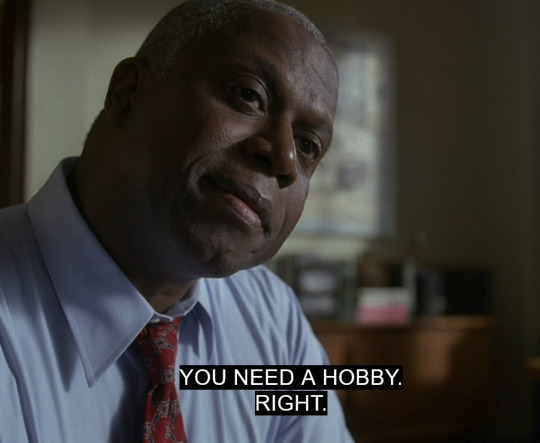


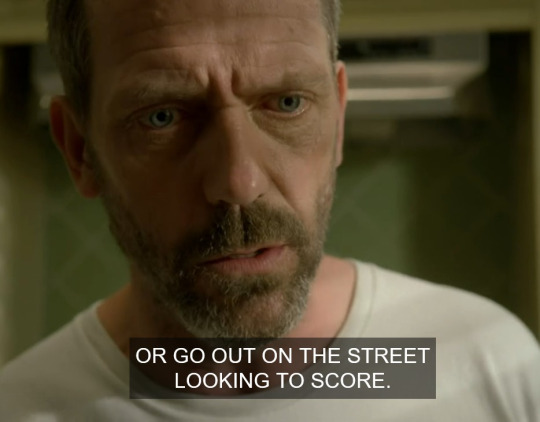
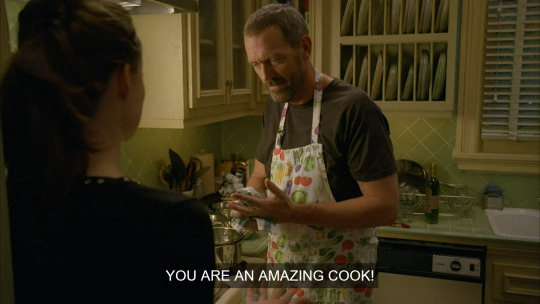
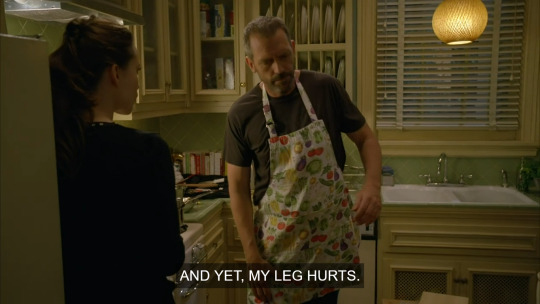
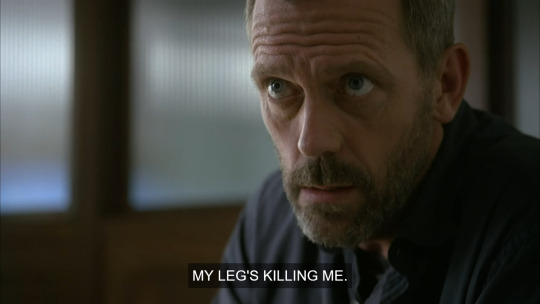
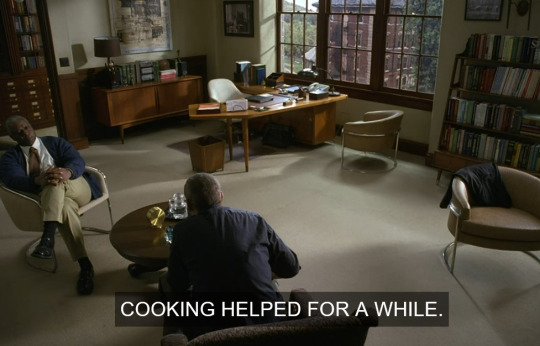
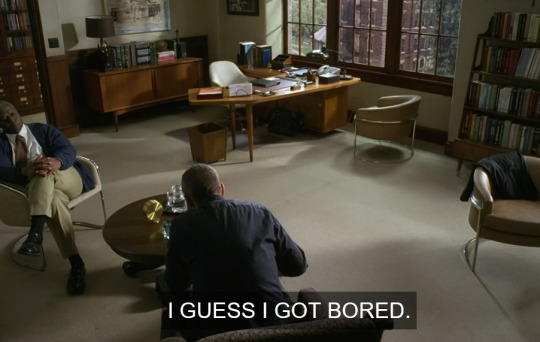

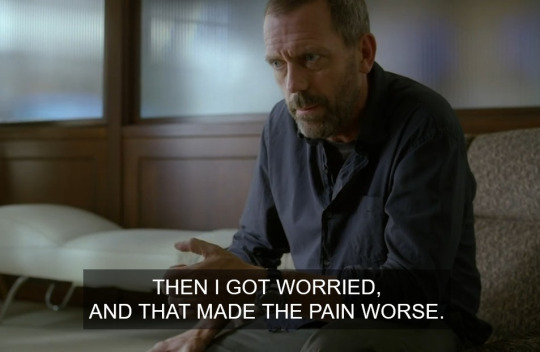
gee i wonder if the issue could be at all related to the fact that the current treatment plan for his chronic pain consists solely of FUCKING IBUPROFEN
#i get that they're trying to make the point that house's pain flares with emotional distress#which is true! he does have psychological problems that need to be addressed!#but also. also. in addition.#there's this other little tiny minor factor worth mentioning which is#there is muscle. MISSING. from house's THIGH#ibuprofen and hobbies are not a suitable treatment plan for this condition#i'm not very knowledgeable about chronic pain but there have to be more options than this or vicodin#yes house has addiction issues#but what's happening here is not about that!!#he literally needs MEDICAL TREATMENT and he's being denied it!#house staying clean from the specific drug he was addicted to AND being on a proper pain management plan#are not mutually fucking exclusive#house md#house season 6#house 6x2#i need a tag for#house's chronic pain#house pain management#op
399 notes
·
View notes
Text
It always feels AMAZING when someone looks at ur data and goes “yeah that’s not even kind of normal”.
So I’m not crazy. I’m not losing my mind, or being dramatic, or blowing things out of proportion, or any of the other dozens of things I’ve been told.
#chronic illness#chronic pain#chronically ill#don’t even know what to tag this as bc I don’t know what it is yet#going to the dr tomorrow and hopefully I’ll have more answers#or at least a direction to go in#rn it’s looking like a lifelong condition that people aren’t sure how to manage#cancer or a different thing that I don’t know how to describe without saying it but I don’t want to jump the gun
91 notes
·
View notes
Text
My daily routine includes trying to convince myself that I’m not the perceived “crazy client” my doctor’s office talks about 😊
#I am autistic so I’m awkward on the phone#and my condition isn’t really managed well yet so I’m always calling them#chronic illness#chronically ill#chronic fatigue#chronic pain#disability#disabled#lupus#fibromyalgia#pots#autoimmine disease
19 notes
·
View notes
Text
Bumblebee Week Day 5 - Disability
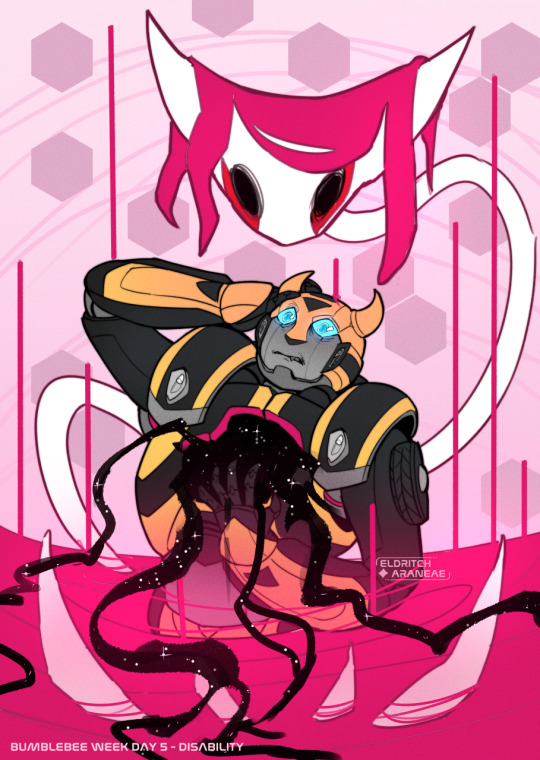
Scattered dreams
Collect what I used to be
This fight is an infinite maze
A hunt but without the chase
Reject the cure
My symptoms, your metaphor
Immortal yet still so feeble
Half human addictive evil
For a life I obsessed you
Now its time to forget you
And no matter how hard, I try
Cross your heart and swear you'll try
I am full of forgiveness
Let me out of this illness
There's a reason I stand revived
No more fears where tears don't dry
Song: Cyhra - Letter to Myself
#bumblebeeweek2023#bumblebee#transformers#maccadam#my art#sparkpulse au#more angsty Bee pieces :)#in this case its both physical disability and mental disability#a chronic illness of his spark affects him and because of Primus' neglect it had led him to horrific trauma#there are many things on his mind and many dark secrets were sealed away#yet they will resurface and remind him that all those thing that happened are forever part of him#as he's seeking answers in hopes to find closure with no end in sight#meanwhile Ratchet and Glit fear that he might just drop dead as they have zero idea what kind of condition he has and how to manage it#they try what they could but there is always this underlying fear
127 notes
·
View notes
Note
I have a question, but it may be already have been answered in the story (my brain is just not the best with memory).
Since vampirism symbolises for you chronical illness (which, omg, that is a hot take I've never thought off before and love from now on), does Steve count as chronical ill, too, with the whole halfvampire thing going on? So, would his uncontrollable time jumping each month be a symptom of that chronical illness?
not in the story, no worries! Just a possible interpretation and my personal intent when writing.
As a small aside I personally don't like to think of chronic illness as something that people "count" as, so to speak, it's an extremely personal label and incredibly varied between individuals and as with all disability there is never such thing as hard lines or black and white... but I understand why you worded it that way and I understand what you're asking.
So, yes, Steve is also chronically ill within this framework. The entire comic is sort of shaped around this, to be honest! I mean he canonically has some pretty extreme memory issues... He's also canonically homeless (not that this is an illness but I just mean it's something I think most people forget about him when discussing him). And, yes, his condition is uncontrollable and is severely impacting his ability to live the life he wants to live.
He has just been barely coping up to the point we meet him, and has been very desperate which is what led him to creating that list of deviations. He has periods where his body is out of his control, he is unable to form relationships, he hurts others without meaning or wanting to... Yeah. He's metaphorically relating to a lot of things, really.
So, yknow, you're welcome to interpret him as you'd like! for me I relate a lot with my various issues and conditions and thus that's why I've projected on him the way I have, but of course I would understand entirely different interpretations of what is inherently metaphorical.
#I also have an extremely personal relationship with addiction#and also with anger management issues#among other things#uhm#and so reading this I think it is possible for someone to read that into it as well#however personally I dont really like vampires as a metaphor for addiction... for many reasons but#I think it's also just a bit messier than I would like things to be#and isnt how I really would personally choose to portray an addict at all.#though I do think of addiction as an illness as well so. as I was writing this I was sort of seeing glimpses of that as well#so. idk!#interpret how you like.#I mean as long as the interpretation isnt erasing his very real struggle#he is straight up homeless because of an uncontrollable condition that he has#so like. it's serious#I recognize that the way I write sort of puts a happy go lucky veneer over things#and I'm aware that it sort of hinders the severity of the situation somewhat inherently#to where people have been SHOCKED I look at steve as chronically ill when he... the entire comic is based around it...#my personal theory for this is that I uhm. me and my worlds are very accomodating and so the struggles are more internal#rather than necessarily external#besides of course the like cops being after him#but like because it's less societal and more internal I think many people don't recognize it#and because people are gentle and understanding I think they recognize it less...#I dont know how to explain this properly you will have to forgive me.#but it's something I wonder on often. why don't people recognize his extreme pain and his terrible situation for what it is..?#is it cause he has a rich boyfriend now and money is solving the situation or...#anyways.#anon#asks#if its simply because of how I write I think I need to work on that.#but if its because of people not recognizing illnesses in people who 'seem fine/happy' then I'm glad to make people second guess things
11 notes
·
View notes
Text
Oh god why the physical discomfort is happening again. Why is it so tiring to walk or do anything. No matter how much I sleep, I'm still tired. I manage my diabetes well. Why does my body just make existing feel bad.
#I don't fuckong know who i am.#im so fucking tired#diabetes management#I guess#Woo hoo. I have a rare condition that I can't find shit about anywhere#And I have to convince fucking doctors that I know what I was diagnosed with as a child#No its not type 1. No its not type 2 either for fucks sake#Yes its chronic. No my fucking eating habits didn't cause my body to not work#Yes I am sure can you shut the fuck up about eating habits#No seriously fucking stop#I don't give a shit if you think that I could've prevented the chronic illness that is literally a GENETIC MUTATION FOR FUCKS SAKE#MY FUCKING EATING HABITS DIDNT DO SHIT TO CAUSE THIS.#WHAT VOULDVE CAUSED IT WAS MAYBE ALL THE CRAZY FUCK8NG STRESS I WENT THROUGH AS A CHILD. AND THE TRAUMA. AND THE FACT THAT DIABETES RUNS IN#MY FUCKING FAMOLY#why am i so angry#I hate feeling so bad#I just wanna colapse in bed and sleep#Im so fucking tired but I can't even blame it on diabetes management#Im getting enough sleep#I think#I didn't stay up last night#Why am I so tired#I just want to feel ok#I can't have caffine because my parents won't let me#Im just so fucking tired.#What the fuuuck
3 notes
·
View notes
Note
Hi Moth, @tilin-forever here (for the second time lol),
I just recently learnt about MCYT Physical Disability Week (Jan 28th-Feb 3rd) and since I saw Day Two was about Deaf/HoH (which I’m super excited about since I’m deaf with a cochlear implant), I’m actually been a bit inspired to write a fic for it! Never written a fic before, but that’s all part of the fun of being in a fandom haha
Do you know if you have time to make any art for this event? It’s okay if school is going to be really busy during that time and you don’t have time, just wanted to let you know of the event (as well as any of your followers who might be interested in following/participating in it!)
Glad to know your break was alright, hope you get your snow day <3
sorry, i must have fallen asleep just as you sent this last night! but hey man, that’s exciting!! :D good luck on your first fic!! i bet it’ll be great
i really want to participate in that event, and i’m hoping since it’s two weeks out i’ll have time to make stuff in advance, but i’m just not sure how busy i’ll be with school so we’ll see how it shakes out. i signed up for some tough classes this semester, and i don’t quite know what the workload is going to look like yet so i’m honestly a little nervous ^^; hopefully i can at least participate in a few days, even if i can’t do all of them! haha, maybe if i get that snow day i’ll have more time to prep my art
for anyone else interested in mcyt physical disabilities week, here’s the blog with all the information! you can make stuff about canon disabilities or your own headcanons. it looks pretty cool!
#ever since i was a kid i’ve always had friends who are physically disabled. it’s such a normal part of life for me#so i’m all about visibility because i think it’s something i was lucky to have#if that makes sense#and if i can be really honest. the last few years i’ve been slowly coming to terms with the fact that i am too#i have chronic pain caused by two different conditions and it’s more limiting than i ever wanted to admit#so i’ve got a personal investment in this one haha#would love to participate— it’s just a matter of managing my time!
9 notes
·
View notes
Text
i went to PT thinking i had pulled a muscle in my shoulder. nope. my 3rd rib was out of place. we had to push it back in, which was painful but felt so good. i'm just tired of this EDS garbage.
#authorial rambles#language of the chronically ill#hEDS#ehlers danlos syndrome#i hate managing this condition 24/7 365#the slightest movement could cause something to dislocate or sublux and i hate it
8 notes
·
View notes
Text
mfw my doctor says "you'll feel much better after this treatment" but now I'm feeling oh so much worse

#“youll feel better after this” is the new “your labs are normal” to me bro.#stop lyinggggg tell me how sucky its gonna be and tell me it could potentially irritate my condition if youre wrong.#sometimes its fine to just be wrong. 90% of managing chronic illness is gonna be wrong. its finding what helps#chronic illness#chronically ill#chronically ill memes#chronic illness memes
7 notes
·
View notes
Text
it's so fucking DIFFICULT managing a huge variety of symptoms and illnesses. it feels impossible to keep up with the care for 20+ conditions - im always falling behind or slipping up on something that'll inevitably cause damage to my already abysmal health.
#rambles#disability posting#i cant keep up with this shit#yesterday i lost half the day to a chronic fatigue spike#today my depression and ed are worse than usual#im trying to manage all these conditions without medical assistance bc i cant afford#the kind that i need and without a trained caretaker#my gf is lovely but shes ALSO disabled and has little to no idea on how to manage#my mental health symptoms that can get really bad really fast and need attention asap#if i had one condition flare or worsen every day each month id only have like a week or less or each month#where im sitting at baseline instead of crisis
4 notes
·
View notes
Text
This is not a "this kind of disabled person should kill themselves or their experiences with their disability warrants killing themselves" post. People with these illnesses and disabilities can and do live full beautiful lives and deserve to be able to enjoy themselves and live long lives.
This is an "if I gained these illnesses or disabilities because I have family history of them on top of my multiple illnesses and disabilities I likely would die very young without extremely extensive support that I do not and will never have access to and I'm complaining about that" post. That said.
If I get any of the following diseases or disabilities I will just fucking die, actually.
Diabetes
Cancer
Progressive endometriosis or pcos
Rheumatoid arthritis
Alzheimers disease or some other form of dementia
Chronns disease
Any type of non-fatal organ failure
Parkinsons disease
Muscular dystrophy of any kind (I experience atrophy but not dystrophy and I am able to regain muscle mass with a lot of time and work, something not possible for people suffering with most kinds of dystrophy)
Any form of substance abuse or addiction
High cholesterol
High blood pressure
Low blood pressure
Hypo or hyperthyroidism
Any type of seizure disorder
That is all thank you.
#I already have disabilities and illnesses that would massively complicate any of these if I got them#What would be a perfectly manageable condition for anyone else would be fatal to me#Not because I would be upset about it and give up#Though I would be upset#But because if I developed like arthritis or something performing basic functions will become impossible#And I will be fully immobile#So without care that I can not afford and do not have access to I will likely die very fast#disability#chronic illness#chronic health#mental health#mental illness#cripple#cripple punk#disabled
8 notes
·
View notes
Text
Here's a little secret about me: despite recieving a medical education, I hate being a patient. There are a lot of reasons: medical trauma, the general assholery of the medical system, the fact that noone explains you shit, the fact that doctors mean time, and effort, and sometimes money, and every single time I feel like I shouldn't be taking their attention from patients that are more "worth it".
When I was seventeen, it took me throwing up 14 times, nearly blacking out and falling into an almost-crisis state before I agreed to be hospitalised. And, as I was lying in bed, a litre of saline solution being deposited into me asap because the dehydration was that bad and two ambulance personnel holding me down, I still tried to get up to pack my things to get to the hospital.
I spent five days there.
I don't remember much of the first two ones, constantly blacking in and out of consciousness.
This year, I had to face something even more uncomfortable than being the asap hospitalisation person - and it was... Planned medical care. A planned surgery, to be exact.
I wasn't nervous about the procedure itself - when you spent like, a year constantly talking about pre-op and post-op and assist in surgery during practicals and see people cut open and cut open some stuff by yourself, the idea of someone rummaging around inside of you with tiny knives looses the typical "oomph" it has. I mean, I was being put in a special facility that's specifically for situations like mine, with a team of surgeons who spent years honing their craft. I knew what was going to happen. There would be anaesthesia, for god's sake.
But everything around the whole thing was just... Ugh. Doctors, nurses, tests, more tests, even more tests, the lack of communication leading to a nervous breakdown happening due to me not knowing when to come in... And, to top it all off, the damn tumour, like it knew it's days were numbered, was causing more and more pain by the day. Life lost it's colours. I spent day after day stopping, freezing up when another pain wave hit, coming home exhausted after having to mask it, slowly slipping away from socialising.
I have to leave, I've got an appointment.
Sorry I skipped your class, I had to get some tests done.
I'd love to go with you, but I need to clean my apartment; I doubt it's gonna be on my mind when I get back with a cast.
The only thing that kept me going was a deep, grim understanding: this is miserable, but continuing to live with that... thing growing inside me is worse.
... It's all over now, of course: nearly a week of school missed, a hazy experience, - god, they really overdid it with the drugs, - stitches, and a cast on my hand.
And it doesn't hurt anymore.
...No, I mean, it does, but compared to before? Piece of cake.
Nearly a year of constant worry and pain, gone.
Soon, all I'll have to show for it is a neat little scar on my hand that'll show that one day in the past, little old me was scared enough - and brave enough - to take the first step.
And as time slowly marches on, the colours that bled from my life, taken over by increasing pain, slowly turn bright again.
I'm just.
I feel like the joy came back into my life.
Like things have purpose again.
Like I can live.
I can live.
I don't have to feel pain anymore.
#i've cried so much from stress and pain and worry recently that it feels weird to cry from relief#the entire experience also completely restructured the way I think about the medical field and my future practice#and how little we truly spend time on learning about chronic health conditions and managing them#....and how I definitely should be stricter about my own health boundaries#aight#tw med talk#tw medicine#tw surgery#i mean‚ on a worse note#my mother was a poisoning experience throughout the whole thing#she treated me GETTING SURGERY FOR HORRIBLE PAIN like it was her own amusement and actually had the gal to get offended at me#for saying that I 'had nothing new to say to her' and for quote on quote 'not telling her the details '#BITCH DO YOU THINK THIS IS FUN???? THAT I SHOULD TREAT IT AS AN EDUCATIONAL EXPERIENCE?!?!?! it's a TUMOUR FOR GODS SAKE!!! A TUMOUR!!!#like Just because I'm a med student doesn't mean that this wasn't deeply raw and traumatising
2 notes
·
View notes